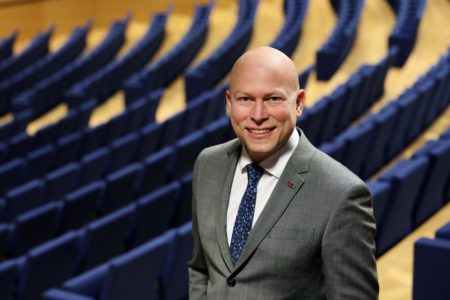 Mr Pallage, after only a few weeks in Luxembourg in your new position, can you please give us an idea of your first general impressions?
Mr Pallage, after only a few weeks in Luxembourg in your new position, can you please give us an idea of your first general impressions?
I sense a lot of enthusiasm and effervescence at the University of Luxembourg, and I would like to thank the University community for making me feel so much at home in Luxembourg and in Belval. In my opinion, this University is one of the European institutions of Research and Higher Education with the highest potential. It is already among the leaders in many fields and its growth is quite spectacular. It is the most exciting challenge I can imagine to contribute to the development of such an institution.
What did you know about Luxembourg before confirmation that you would become rector of the University?
As I grew up in Malmedy, Belgium, I visited the Grand Duchy many times in my childhood. However, it seems to me that Luxembourg has developed considerably over the past decades. Luxembourg is a very cosmopolitan place today, open to the world, highly ambitious and multi-cultural. Moreover, it has experienced amazing growth and diversification. The country can legitimately aspire to become a Silicon Valley of Europe, and our University plays a role in realising this vision.
Does what you see in your daily life at the University meet your expectations? Have you had any good surprises, or perhaps not so good?
I learned that the University is very much the mirror of Luxembourg society: It is pragmatic and highly innovative. For example, we celebrated the opening of our Incubator, in the direct neighborhood of Luxinnovation, just some weeks ago. Designed to accompany members of the University community from the idea to the business plan and beyond, the University of Luxembourg Incubator will awaken the entrepreneurial spirit in a generation of young people.
I also very much appreciate the multilingual daily life on campus. Together with the interdisciplinary character of the institution, this makes our study programmes unique and provides our graduates with advantages on the job market.
What are the key elements in your roadmap?
Working on organisational and administrative excellence are among my first goals. The University needs to become agile, resource-efficient, client-oriented and financially transparent. We must be a model of university management.
A second key factor is prioritisation: We cannot be excellent in every subject – so it is necessary to focus on a choice of the most promising fields. The new Four-Year-Plan has identified key research focus areas: Materials science; Computer science and ICT security; European and international law; Finance and financial innovation; Education; Digital and contemporary history; Health and systems biomedicine; Data modelling and simulation.
Moreover, I will stress the importance of teamwork. Collaboration with the other research players in Luxembourg, the Ministries and private companies already works excellent. These “short distances” are an enormous strength of the Luxembourgish research ecosystem. If we can develop this, we can be a motor of innovation for the country and Europe.
The University of Luxembourg is still quite young. Do you consider this as a handicap or an asset?
This is clearly an advantage, as its level of development and its age offer still great flexibility and every possibility to shape the institution and its development. For example, many universities strive for interdisciplinarity and networked thinking today, but for many established institutions this is very difficult to realise, as they have been working for many years in structures with silos and clearly separated departments. In contrast, our University was from the start built as an interdisciplinary university. It is part of our DNA that computer scientists collaborate with education scientists or experts in Law.
What role do you think the University should play in the development of the innovation ecosystem in the country?
I think the University should be the cornerstone of the Luxembourgish innovation system. As an economist, I am convinced that the three most important drivers of economic and social development are Education, Research and Entrepreneurship. The University of Luxembourg has a mission to provide all three of them. We aim to be a reliable partner for society, businesses and political decision makers to find solutions for their challenges, for example by preparing students for fast-changing requirements in the job market, giving research-led policy advice, and conducting cutting-edge research. By investing in us, this society invests in its future.
Are you starting with a brand new slate, or do you think you can duplicate some of the approaches that you had in place in Quebec?
The University of Luxembourg reminds me in many ways of North American Educational institutions. Much of what I know from my time in the United States and in Canada is practiced here. Especially the focus on research enriching the teaching is very much North American. The student is at the center of our teaching, which is highly interactive, multilingual and international. His success in life is our success.
What for you would be the one – or more than one – criteria for measuring the success of your mission?
Of course, you have ways to quantify success, such as the international University rankings, indicators for scientific productivity, or amount of acquired external funding. These indicators are important to measure our progress and help us improve. But first and foremost, my mission will be a success if in ten years the whole of Luxembourg is proud of its University and if this University is considered worldwide as a leading university.


